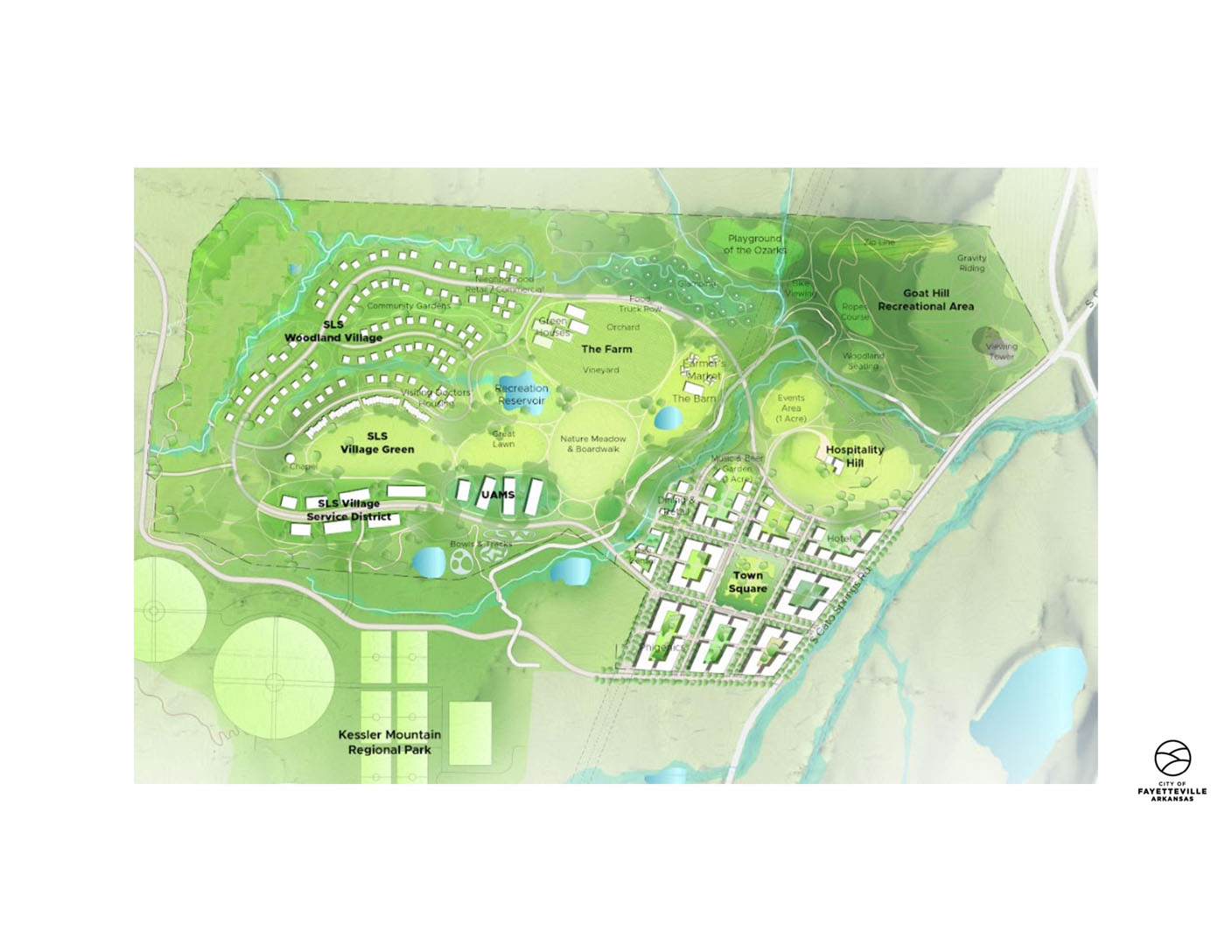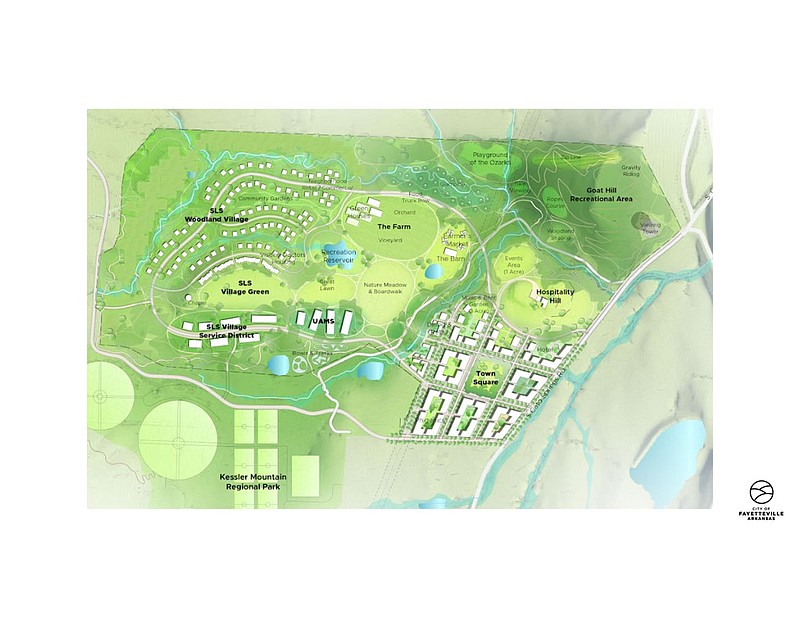FAYETTEVILLE -- A regional nonprofit group has a plan to provide neurodiverse adults with housing, work, recreation and services all in one location.
The group, Supporting Lifelong Success Community, plans to be part of a 231-acre development in the southern part of town, between Kessler Mountain Regional Park and Cato Springs Road. A concept shows rows of homes, a commercial area, outdoor spots for recreation and leisure, and facilities providing medical and basic services.
Ashton and Betts McCombs founded SLS Community in 2016. Their daughter, Anna, was diagnosed on the autism spectrum with pervasive developmental disorder at 2 years old. The family had difficulty finding services for Anna in Arkansas and placed her at institutions in Baltimore and Boston. Along the way, the couple met other families who similarly struggled to find services for their loved ones with neurodivergence.
Neurodiversity or neurodivergence refers to people with autism, Down Syndrome, or other intellectual and developmental disabilities.
South Cato Springs Holdings, a separate limited liability company partnering with SLS Community, acquired the land in 2019. The land originally was donated to the Razorback Foundation, the nonprofit group supporting University of Arkansas athletics, by Dallas Cowboys owner and former Razorback football player Jerry Jones. South Cato Springs Holdings bought more than 230 acres of the 256-acre property for $6 million, according to property records. Money for the purchase came primarily from private investors, with some financing from a bank loan.
Ashton McCombs died in November 2021 from a malignant brain tumor. The family wants to continue building upon the groundwork he laid and make the dream for Anna, now an adult, a reality. His son, Ashton McCombs IV, is now executive director of SLS Community.
Setting up for success
The city was awarded $3 million in March in federal community project money at the request of 3rd District Rep. Steve Womack, R-Rogers. The city was awarded the money on behalf of SLS Community to pay for a sewer connection running through the property. The City Council has to vote to accept the money in order to receive it, and a grant agreement is forthcoming from the U.S Department of Housing and Urban Development, said Devin Howland, the city's economic vitality director.
The city also plans to build an access road to SLS Community from Cato Springs Road that would connect to Kessler Mountain Regional Park. Estimated budget on the project is $3.48 million using money from the economic development bond issue voters approved in 2019 and other sources as necessary, Howland said.
SLS Community hasn't submitted development plans to the city. Getting the road and sewer line installed will enable the project to start in the next two to five years, McCombs said.
The first phase of the project will involve building a clinic focused on the health and well-being of neurodiverse adults, operated by the University of Arkansas for Medical Sciences. The conceptual drawing shows a row of buildings near the center of the campus for the clinic.
The genomic clinic will provide medical and therapeutic services to residents, according to a presentation the City Council received on the project Tuesday. The clinic also will pair critical care with research capabilities and serve as home to an academic program to train the next generation of health care professionals, the council heard.
The university has medical geneticists and psychiatrists who provide outpatient services for neurodiverse residents with in-person and telemedicine visits, hospital spokeswoman Leslie Taylor said. Opening the clinic at SLS Community would greatly expand those services in Northwest Arkansas, she said.
John Newman, executive director of Life Styles, a separate local nonprofit group providing housing and services to neurodivergent residents, said he welcomes development of the SLS Community. Life Styles can provide housing to about 30 residents at its community southeast of Porter Road and Deane Street in Fayetteville and has another 110 who live throughout Northwest Arkansas, he said.
Housing availability and staffing are the biggest challenges Life Styles faces, Newman said. He said he's talked with the McCombs family about the project, and the model sounds different from what Life Styles offers, with the all-in-one live/work/play approach on more than 200 acres.
Newman said the more help available for neurodiverse residents, the better. The need is great, he said.
"Giving people choice and opportunity about the services they receive is a good thing," Newman said. "Different environments for people is really important."
Framing the issue
McCombs described a "quarterback" role for his family's nonprofit group. Partner agencies, both public and private, would contribute to a "collective impact" model providing access to housing, employment, recreation, support services and a sense of community, he said.
Neurodiverse people have a wide range of support needs, he said. Some need periodic drop-ins for support while others require 24/7 assistance from professionals, he said.
McCombs said people with intellectual and developmental disabilities are no longer eligible for the programming and financial assistance they received under the federal Individuals with Disabilities Education Act once they turn 21. After that, they must turn to a labyrinth of government services. Those services vary greatly by state. He referred to the gap between services provided to neurodiverse children and adults as the "services cliff."
Neurodiverse adults often wait years to access services, he said.
Arkansas offers a number of services to adults with intellectual or developmental disabilities through the state's Department of Human Services. Those with Medicaid can access physicians, personal care, therapy, outpatient counseling, clinical day treatment, medicine and medical equipment and hospital services.
Medicaid-eligible residents of all ages can apply for home- and community-based services not included in traditional Medicaid through the Community and Employment Support Waiver, according to the DHS website. The waiver helps clients live in their communities rather than in an institution. Waiver services involve professionals working with clients to manage plans for employment, supportive living, financial assistance and care coordination.
There are more than 3,000 residents on the waiver waiting list. Gov. Asa Hutchinson announced a plan in December to clear the wait list by 2025.
Additionally, 30% to 40% of neurodivergent adults in the United States are unemployed, according to the Center for Neurodiversity and Employment Innovation at the University of Connecticut. The national unemployment rate was 3.7% as of August, according to the Bureau of Labor Statistics.
The key to solving the unemployment issue is to celebrate the different abilities of people with neurological conditions, not treat those conditions as deficits, McCombs said. Residents of SLS Community would be able to work at the commercial spaces shown near Cato Springs Road in the conceptual plan.
Organizations and businesses that set up at the site will become part of the SLS Community network, McCombs said. Jobs would be available to community residents and people who live outside the community. The nonprofit group envisions a workforce training program for neurodiverse adults with the goal of job placement aligned with their talents and abilities, he said.
An essential component is providing education and best practices to employers for proper integration of neurodiverse adults into the workforce, he said.
Mayor Lioneld Jordan and city staff have worked closely with the McCombs family to help launch the SLS Community.
"Neurodiverse residents have many unmet needs and often lack opportunities and quality of life that many of us take for granted," Jordan said. "We are working with the SLS Community project team because we believe their project will support this highly underserved and vulnerable population."
 A drawing shows the conceptual plan for SLS Community within a 231-acre site, developed by Crafton Tull, Core Architects and OSD. The community's planned location is in South Fayetteville between Kessler Mountain Regional Park and Cato Springs Road. The community would provide housing, employment, recreation and services to neurodiverse adults. (Courtesy Photo/Fayetteville)
A drawing shows the conceptual plan for SLS Community within a 231-acre site, developed by Crafton Tull, Core Architects and OSD. The community's planned location is in South Fayetteville between Kessler Mountain Regional Park and Cato Springs Road. The community would provide housing, employment, recreation and services to neurodiverse adults. (Courtesy Photo/Fayetteville)On the web
To learn more about SLS Community, go to:
The story was updated to correct the Community's involvement in the new campus.

